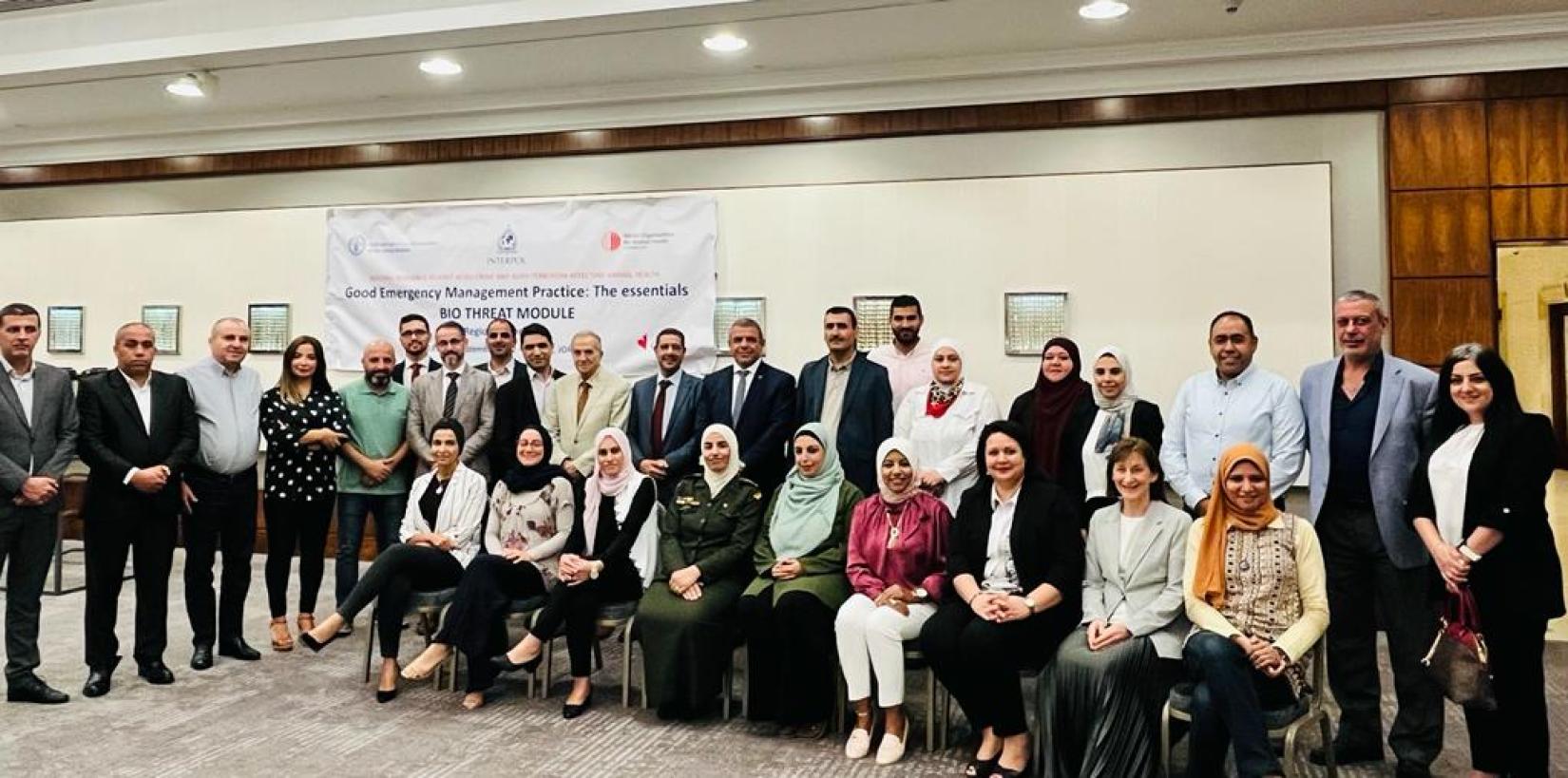FAO conducts a workshop on the Good Emergency Management Practice Bio-Threat in Jordan
18 September 2022

Amman - The Food and Agriculture Organization of the United Nations (FAO) in cooperation with the Ministry of Agriculture (MoA) launched today a workshop on the Good Emergency Management Practice - Bio-Threat (GEMP-BT). The workshop is tailored to veterinary services and law enforcement agents from Jordan, Egypt and Lebanon to present the new approach and notions of Good Emergency Management Practice (GEMP) and a brand new module addressing the risk of bio-threats, under the project “Building resilience against agro-terrorism and agro-crime threats to animal health.”
The workshop was under the patronage of his Excellency Eng. Khaled Al-Hunaifat, Minister of Agriculture and was attended by partners, Jordanian and Regional veterinarians and relevant stakeholders.
The GEMP-BT training, which was implemented by an FAO team and a representative from the OIE regional office, with INTERPOL supporting remotely, enabled participants to gain an understanding of the significance of potential biological threats to animal health and production; apply the GEMP methodology to preparing to respond to agro-terrorism and agro-crime; become familiar with the prerequisites for prevention, surveillance, detection and response to agro-terrorism and agro-crime, and adapt them to specific contexts and situations; and understand the specifics of handling, securing and tracing evidence.
The FAO Representative in Jordan Eng. Nabil Assaf, said, “FAO, the World Organization for Animal Health and INTERPOL are partners in this international project to build sustainable global resilience towards animal health emergencies caused by terrorism and agricultural crime.” He added that, “FAO's Emergency Management Center for Animal Health has begun holding training programs on Good Emergency Management Practices, a reference document on key principles that help veterinary services standardize and improve their ability to prepare and respond quickly and appropriately to animal health emergencies. This tool is complemented by a module that specifically addresses aspects of surveillance and response to criminal or terrorist acts that require cooperation between veterinary services and law enforcement.”
Dr Ghazi Yehia. OIE Regional Representative for the Middle East stated that, “The World Organization for Animal Health actively supports its members to all hazards and multi-sectoral approach to plan for emergencies including animal health emergencies that might originate from crime and even terrorism.”
On behalf of HE Eng. Khaled Hnaifat, Minister of Agriculture, the Chief Veterinary Officer at the MoA, Eng. Issam Hawwa, said, “The Ministry of Agriculture is developing many long-term strategies for the agricultural sector and its various fields, such as the National Strategy for Agricultural Development 2016-2025.therefore, the MoA has prepared the national strategy for managing crises and disasters in the agricultural sector by taking several strategic steps, the most important of which is analyzing and evaluating the reality of the Ministry of Agriculture’s handling of these crises and identifying the general challenges that the ministry can face. ”
The project “Building resilience against agro-terrorism and agro-crime threats to animal health.” is funded by the Global Affairs Canada and implemented by a consortium gathering the World Organization for Animal Health (OIE), the Food and Agriculture Organization of the United Nations (FAO) and the International Criminal Police organization (INTERPOL) and is being implemented in cooperation with the Ministry of Agriculture and the Jordan Armed Forces. Through its activities, including this workshop, the project aims to strengthen collaboration between veterinary and law enforcement authorities to build sustainable global and regional capacity in the event of an animal health emergency resulting from an act of agro-terrorism or agro-crime against animals.
Middle East is one of the three-targeted regions together with North Africa and Southeast Asia, and Jordan has been selected as a pilot country. It is expected that many countries will benefit from the outcomes of this innovative project.
